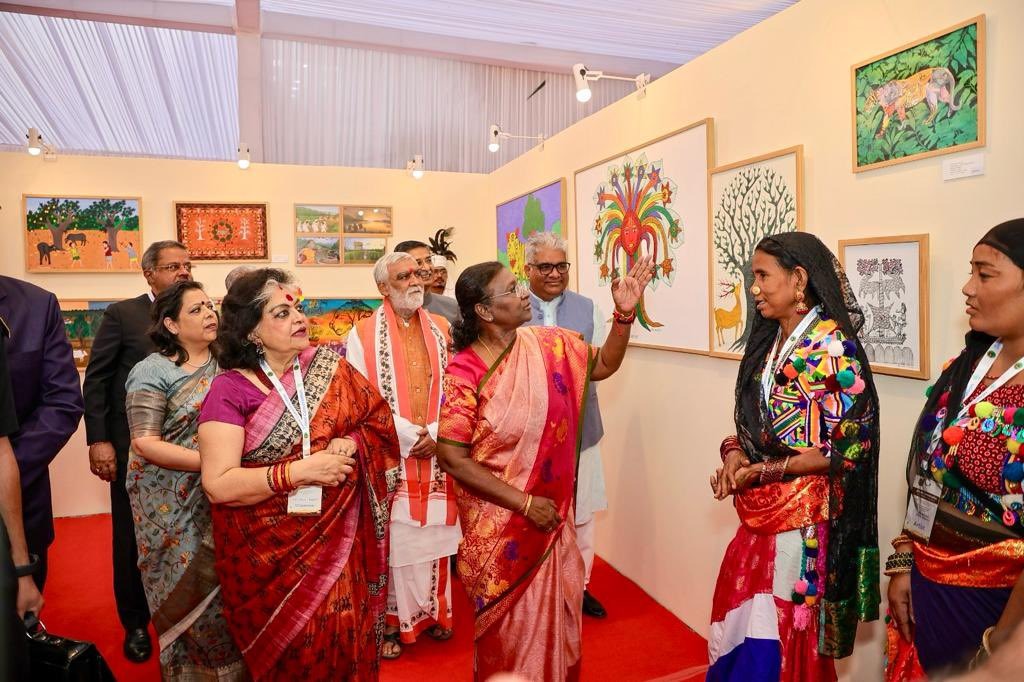NEW DELHI: An enchanting showcase of tribal art and India’s successful tiger conservation efforts was unveiled in New Delhi on Friday as President Droupadi Murmu inaugurated the “Silent Conversation: From Margins to the Centre” art exhibition. This event, jointly organised by the Sankala Foundation and the National Tiger Conservation Authority (NTCA), commemorates the 50th anniversary of Project Tiger’s inception in 1973.

The exhibition brought together 42 tribal artists hailing from 35 tiger reserves across India, who displayed and sold their distinctive artwork. Each community presented its unique art style, including Warli, Gond, Bhil, Patachitra, Khovar, and Sohrai, among others, showcasing their vibrant culture and profound connection to the natural world.
FLASH: President of India, #DroupadiMurmu, commends tribal communities in their ability to conserve #wildlife while calling them the best wildlife conservationists in the country, at the ‘Silent Conservation: From Margins to the Centre,’ a #tribal art exhibition.
“We need to… pic.twitter.com/07O4EQwH9U
— The New Indian (@TheNewIndian_in) November 3, 2023
Notable participating tribes included Saura (Odisha), Gond and Bhil (MP, UP, Chhattisgarh), Santhal and Oraon (Jharkhand, Odisha), Tharu (UP, Bihar, Uttarakhand), Nyishi (Arunachal Pradesh), Chechu (South), and Warli tribe (Maharashtra).

The President, in her inaugural speech, emphasised the crucial role of the communities residing around Tiger Reserves in India’s remarkable success in tiger conservation. She noted that the nation now hosts an impressive 70 per cent of the world’s tiger population, attributing this achievement to the harmonious coexistence of these communities with the majestic tigers and their pristine habitats.
FLASH: Union Minister Bhupendra Yadav (@byadavbjp) thanks tribal community for saving #Tigers in India during the inaugural ceremony for the ‘Silent Conversation: From Margins to the Centre’ exhibition in New Delhi. pic.twitter.com/fw5bu3hinX
— The New Indian (@TheNewIndian_in) November 3, 2023
At the event, Union Minister Bhupendra Yadav underscored the importance of peaceful coexistence, stating, “The tiger is a symbol of strength. By saving the tiger, we are not only protecting our territory but also the tributaries. The number of tigers, once on the brink of extinction, has now exceeded 3,600. Thanks to tribal communities for teaching the concept of peaceful coexistence.”
“We regard the forest as our deity and revere nature. The primary theme of my work is to illustrate how the tribal community is intricately connected to wildlife, particularly tigers. This is what I have attempted to portray — our relationship with nature and wildlife,” said Anjana Marandi, who belongs to the Santhal tribe and hails from the Mayurbhanj area near the Similipal tiger reserve in Odisha. She also had the honour of presenting a painting to the President.
FLASH: At the “Silent Conservation: From Margins to the Centre,” a #tribal art exhibition, a short film has been screened to showcase the success of the 50 years of #ProjectTiger.
Reports @SubhadraSrivas5 pic.twitter.com/pxyDGOO0lv
— The New Indian (@TheNewIndian_in) November 3, 2023
Yamini Singh, the event organiser from the Sankala Foundation, explained the motivation behind the initiative, “The Project Tiger wouldn’t have been possible without the participation of tribal communities. When we decided to emphasise their involvement and celebrate 50 years of Project Tiger, the first idea that came to our minds was to showcase it through paintings.”
Tribal artists from various tiger reserves, such as Odisha’s Similipal Tiger Reserve, Assam’s Manas National Park, and Madhya Pradesh’s Panna National Park, showcased their best artwork, reflecting the uniqueness of their cultures. One artist from Kerala shared, “When we harvest honey in our villages, we leave some on the ground as an offering for the tigers.”
India takes pride in its 54 tiger reserves, inhabited by around 110 tribes. This event served as a poignant reminder of the delicate equilibrium between tribal communities and tigers, highlighting the necessity for mutual respect and coexistence.
The “Silent Conversation” exhibition not only celebrated indigenous art but also provided direct support to the tribal artists, with the proceeds from sales going directly to benefit them. The initiative showcased the rich tapestry of tribal art and underscored the enduring connection that Indian tribal communities share with these magnificent big cats.

